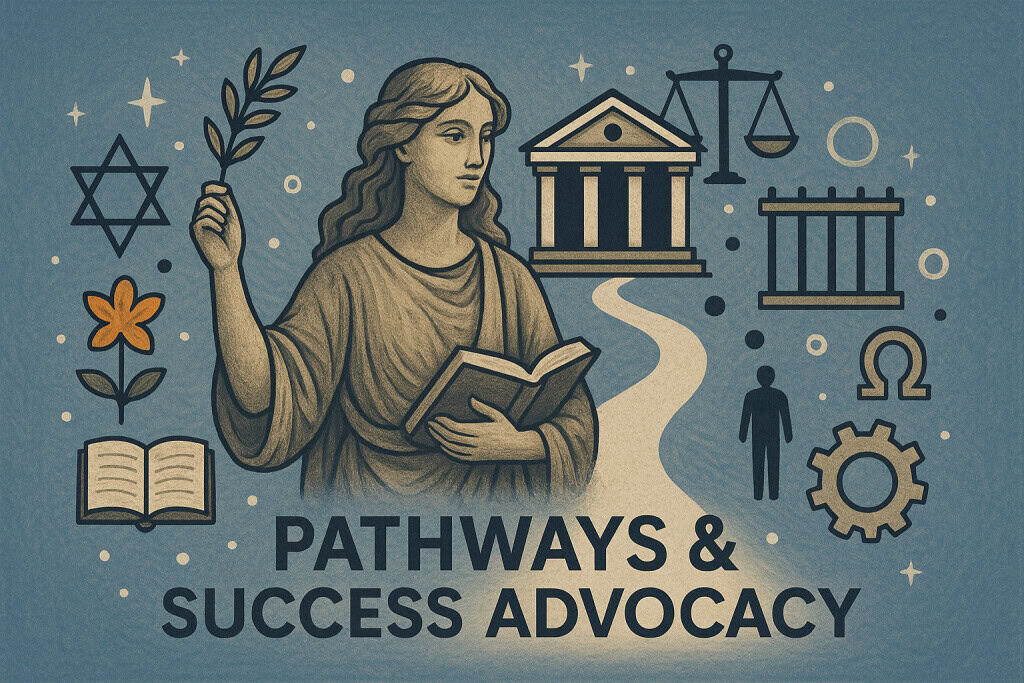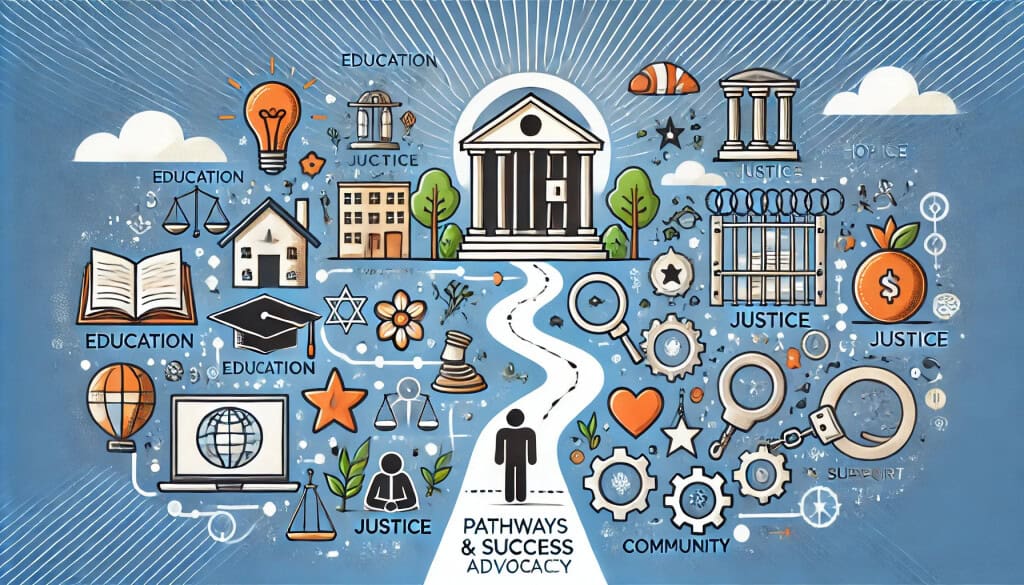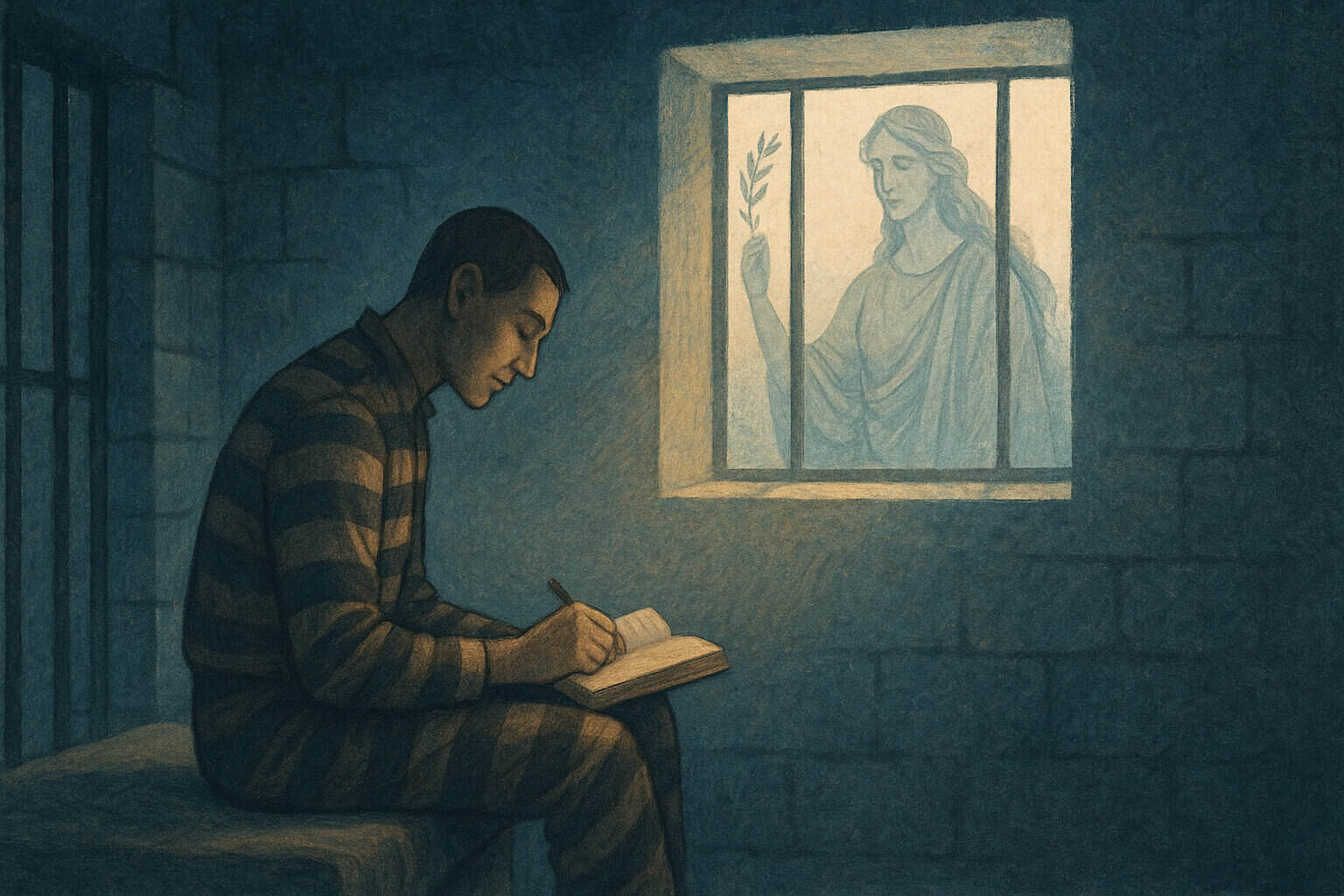A Prisoner Like You
In the year 524 AD, a Roman senator named Boethius sat in a dark prison cell, falsely accused of treason. He had once walked the halls of power as a scholar, philosopher, and trusted advisor to the king. But now, stripped of title, influence, and safety, he waited for the executioner’s call.
In his solitude, Boethius didn’t write letters of anger. He didn’t lash out. Instead, he turned inward—and produced one of the most powerful works ever written in a prison cell: The Consolation of Philosophy.
In it, Boethius tells a story. Not about escape, but about enlightenment. About what we lose when we chase false happiness—and what we gain when we embrace virtue, wisdom, and peace of mind. His words have survived nearly 1,500 years. And they speak to anyone who’s ever felt lost, broken, or trapped.
Including you.
When Life Falls Apart
Boethius had it all. He was a respected philosopher, a high-ranking official in the Roman Empire, and a man of wealth and influence. But it all came crashing down in an instant. He was arrested for a crime he didn’t commit, thrown into a cell, and condemned to die.
Does that sound familiar? Maybe you’re not a Roman senator. But maybe you, too, had a life that fell apart. A mistake, a betrayal, a moment that changed everything. You landed in a place you never imagined—and now you’re trying to make sense of it.
That’s exactly what The Consolation of Philosophy is about. It’s a conversation between Boethius and Lady Philosophy—a symbol of wisdom and truth—who appears to him in his darkest hour. She doesn’t promise him escape. She doesn’t offer revenge. She offers understanding.
The Illusion of Fortune
Lady Philosophy tells Boethius that Fortune is like a wheel—one day you’re on top, the next you’re at the bottom. Power, money, status—none of it is stable. None of it lasts.
We often think, “If I could just get out, get money, get respect, then I’d be happy.” But Boethius learned that those things come and go. What matters is who you are when everything is taken away.
In prison, you’ve lost your freedom. Maybe you’ve lost trust, relationships, your sense of identity. But you haven’t lost everything. You haven’t lost the power to think, to grow, to choose who you become. And that’s where true peace begins.
What Is True Happiness?
According to Boethius, true happiness doesn’t come from outside—it comes from within. It’s not about what you have, but about who you are. Lady Philosophy teaches that the happiest people are those who live with virtue, wisdom, and self-control.
Sound familiar? It’s a message echoed by:
- Marcus Aurelius, the Stoic emperor who wrote Meditations in wartime.
- Nelson Mandela, who said, “I was not a messiah, but an ordinary man who had become a leader because of extraordinary circumstances.”
• And countless incarcerated men and women who have used their time inside to reflect, study, and transform.
When you stop chasing the world’s approval and start focusing on your character—your thoughts, actions, and values—you begin to build real, lasting strength.
Boethius also argued that external things like money, fame, and power are not only temporary—they are outside our control. If your happiness depends on things that can be taken from you, then it will always be fragile. But if your happiness is built on inner peace, discipline, and understanding, it becomes unshakable.
This doesn’t mean life will be easy. It means that even in hard times—especially in hard times—you can find a calm center, a quiet strength, and a reason to keep going. That’s what Lady Philosophy gave to Boethius, and what philosophy can give to anyone willing to think deeply and live intentionally.
So ask yourself:
- What are the things I’ve chased that never really brought me peace?
- What virtues do I admire in others—and how can I live them myself?
- How would my life change if I stopped trying to impress others and started trying to improve myself?
These are the kinds of questions Boethius invites us to reflect on. And the answers can lead to a happiness that no one—not the system, not the past, not even time—can take away.
Using Philosophy in Prison Today
You don’t need a college course to practice philosophy. You don’t even need to read Boethius (though you should—it’s free online). What you need is a quiet moment, a willing mind, and a commitment to growth. Philosophy isn’t about memorizing big words or ancient arguments—it’s about learning to live well, to understand your mind, and to act with purpose. And prison, ironically, can be one of the best environments for this kind of inner work.
Many great thinkers developed their deepest insights not in luxury, but in hardship. Epictetus was enslaved. Socrates was imprisoned and executed. Nelson Mandela spent 27 years behind bars. Yet from confinement, they offered the world their clearest wisdom. You can do the same.
Here’s how you can apply Boethius’s teachings right now:
1. Reflect Daily
- Take 10 minutes each night to write in a journal.
- Ask yourself: “What did I learn today? What am I grateful for? What did I do well? What can I improve tomorrow?”
- Don’t judge your answers. Just write with honesty. Over time, you’ll see patterns. You’ll begin to know yourself better.
2. Read to Grow
- Start reading books that challenge your thinking: philosophy, history, psychology, or memoirs of people who overcame adversity.
- Let these books become your mentors. Learn from their struggles and strength.
- Recommended: Meditations by Marcus Aurelius, Man’s Search for Meaning by Viktor Frankl, The Autobiography of Malcolm X, The Consolation of Philosophy by Boethius.
3. Practice Mental Freedom
- Use breathing techniques or meditation to calm your mind.
- When things around you feel chaotic, remind yourself: “They can lock my body, but not my mind.”
- Try this simple breathing exercise: Inhale for four counts, hold for four, exhale for four, and repeat. Just five minutes a day can clear your head.
4. Choose Virtue Over Ego
- Don’t get pulled into petty arguments or drama. Let your values—not your emotions—decide how you respond.
- Act with respect, courage, honesty—even when it’s hard. That’s how you build real dignity.
- When someone insults you, reflect: “Is this worth my peace? What response reflects who I want to be?”
5. Keep a Philosophy Notebook
- Use a small notebook to write down quotes that inspire you, ideas that challenge you, or questions you’re reflecting on.
- Revisit this notebook often. It becomes a personal guidebook for your journey.
6. Share What You Learn
- Discuss your ideas with others who are also trying to grow. Start a reading circle or philosophy group in your dorm or unit.
- If you have family on the outside, ask them to read with you. Share what you’re learning in letters or phone calls.
Philosophy doesn’t just help you survive prison—it helps you grow through it. It gives you clarity, discipline, purpose, and peace. It reminds you that your circumstances don’t define you—your mindset does.
The Prisoner Who Found Peace
Boethius never made it out of prison. He was executed not long after completing his book. But his mind—his soul—was free. He refused to let bitterness, fear, or hatred define his final days. Instead, he used the power of thought, reflection, and philosophy to find peace in the middle of chaos.
He left behind words that have inspired kings, monks, revolutionaries, scholars, prisoners, and seekers across centuries. His work became a cornerstone of medieval education. Monasteries copied it. Queens studied it. Prisoners in solitary confinement found strength in it. Even today, The Consolation of Philosophy continues to guide those facing injustice, grief, or despair.
Why? Because Boethius didn’t write as a perfect man. He wrote as a human being—broken, betrayed, afraid. And yet, through Lady Philosophy, he reminded the world that even when life falls apart, the mind still holds power. The heart still holds dignity. And the soul can still rise.
He proved that philosophy isn’t just for professors. It’s for anyone who wants to understand life, accept suffering, and find peace in chaos. It’s for the person locked in a cell, trying to hold onto meaning. It’s for the person with regrets, searching for redemption. It’s for anyone who refuses to let pain write the final chapter of their life.
You may feel powerless right now. But you’re not.
You still have your thoughts. You still have your choices. You still have your dignity. And that’s where your freedom begins.
Philosophy helped Boethius die with peace in his heart. It can help you live with purpose in yours.
Final Thought: You Still Have a Mind of Your Own
You can’t control what happened before. You can’t change your sentence. But you can change how you see the world. You can learn to let go of what you can’t control and focus on what you can: your values, your growth, your future.
Just like Boethius, you can use your time not to wait—but to wake up.
Prison can break you. Or it can build you. It’s not about the walls—it’s about what happens inside your mind. Use that space. Fill it with wisdom. Choose peace. Choose philosophy. Choose the kind of success no one can take away.
Boethius did. So can you.
Download a Free Copy of The Consolation of Philosophy
This timeless book is available free of charge. Share it with friends, family, or start a book circle in your dorm.
Download
About Pathways to Success and Georgia Prisoners Speak (GPS)

At Georgia Prisoners Speak (GPS), we believe that education is one of the most powerful tools for breaking cycles of incarceration and building a better future. That’s why we created the Pathways to Success program—a dedicated initiative providing educational resources, skill-building guides, and financial literacy tools tailored specifically for prisoners and their families.
GPS is a prison reform advocacy platform focused on exposing systemic injustices, pushing for policy change, and empowering incarcerated individuals with the knowledge they need to successfully re-enter society. Our educational articles are part of this mission, ensuring that those impacted by incarceration have access to practical guidance that can help them build stability, opportunity, and financial independence.
To explore more resources, visit Pathways to Success.


1 thought on “Freedom of the Mind: Boethius, Philosophy, and Finding Peace Behind Bars”